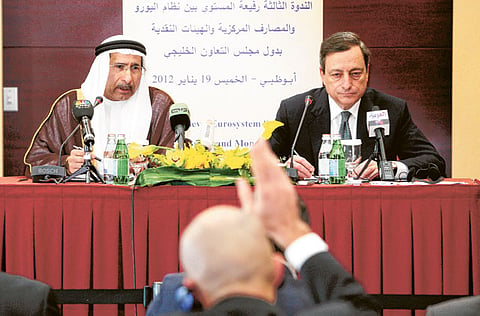Draghi confident of recovery
Significant progress made in stabilising single currency bloc

Abu Dhabi: European Central Bank President Mario Draghi says that Europe is showing tentative signs of recovery but still faces significant economic risks in 2012.
Speaking in Abu Dhabi yesterday, Draghi said that measures already taken by the ECB had avoided a "serious funding crisis" and that significant progress had been made generally in stabilising the Eurozone.
"Looking at the present situation in the Eurozone area one has to be more optimistic than one would have been six or seven months ago," said Draghi, who was flanked by UAE Central Bank Governor Sultan Bin Nasser Al Suwaidi at a press conference in Abu Dhabi.
"We have seen a downward, softening of the business cycle with significant downside risks. We have also seen very tentative signs of a stabilisation at low levels of economic activity," he said.
Draghi said that borrowing costs in the Eurozone were falling and interbank markets were reopening, but would not commit to further interest rate cuts. He lauded the effect of ECB action on the EU banking sector so far, and said that Europe had avoided a second banking crisis.
"I think that by and large this measure has resolved a serious funding crisis that European banks might have faced," he said.
"¤250 billion (Dh1.1 trillion) in bonds were coming due in the first quarter of this year. There could have been a serious banking crisis and I think we avoided that."
Draghi said banks that were experiencing financial issues in 2012 were not the same as those that suffered last year or during the financial crisis.
"[This] shows that the money is flowing through the system one way or another." he said. He also defended the ECB's role in the Eurozone crisis so far.
"Within its primary remit the ECB cares as much about financial stability as everybody else and will do its best to ensure financial stability in the European area," he said.
Asked about the possible expansion of the funds of the IMF, and the contribution of either the Gulf States or China towards making up the shortfall, Draghi said that the fund was not intended for European countries alone.
"It's not only [for] Europe, it is general and it is from this viewpoint the IMF is asking to increase its resources," he said.
"I think the GCC has been very important partners for Europe in a number of ways. They have been partners of Europe for a long time both in terms of oil but also in terms of non-oil trade. They are and remain an important partner," he said.
Draghi would not be drawn on speculation that creditors in Greece would be asked to take a haircut on existing debts from the troubled nation.
"There are ongoing negotiations between creditors and it would not be proper for me to comment," he said.
Draghi and Al Suwaidi were speaking following a seminar between the ECB and central bank governors of GCC states including Oman, the UAE, Qatar, Bahrain and Kuwait.
It is the third seminar that has been held between the banks.



